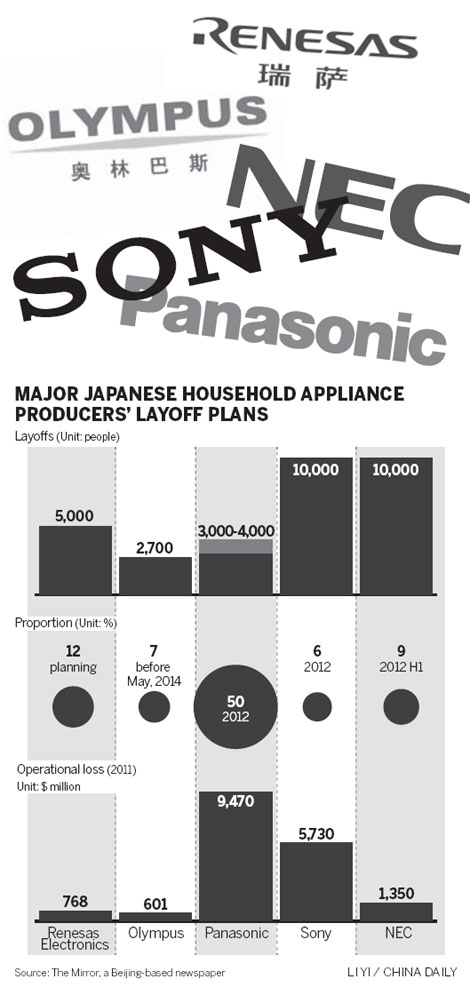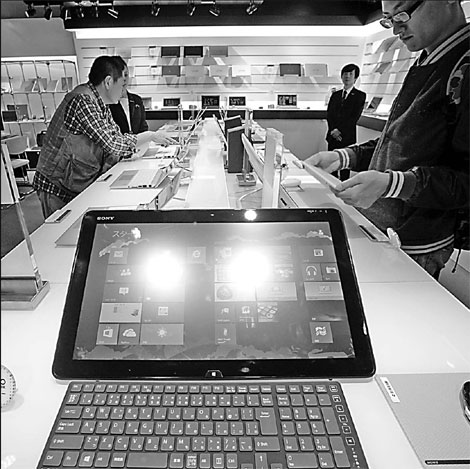Japan 'falls behind' in technology innovation
Updated: 2012-12-03 05:08
By Tuo Yannan (China Daily)
|
||||||||
|
Customers examining notebooks at a Sony store in Tokyo. Many Japanese electronics companies have cut or are going to cut their payrolls because their businesses are in the red. Provided to China Daily |
China and South Korea forge ahead, taking on staff as rivals lay employees off
While Chinese IT companies are taking talented people from their overseas rivals, their Japanese counterparts are laying off workers.
Because the Japanese consumer electronics industry is suffering from a declining economy, many Japanese technology companies are cutting head counts to try to save their businesses. Many well-known names including Panasonic Corp, Sharp Corp, NEC Corp and Olympus Corp are reported to have extensive layoff plans.
Japanese companies used to be famous for having "entire life" employment. Many Japanese people from older generations only worked for one company for their whole life. However, because of the squeezed economy, this tradition has fallen by the wayside.
Mass layoff plans
In the last few months, many Japanese companies announced their layoff plans. Three IT giants - Sony, Panasonic and Sharp - are expected to make a total of 50,000 employees redundant in the near future.
Panasonic, which was founded in 1918 and remains Japan's biggest employer with 330,000 employees, said it will reduce its workforce by about 10,000 employees by March 2013. In the last five years it has posted four consecutive annual net losses. Recently, the company explained that because of losses in its mobile, solar panel and lithium battery businesses, it will have losses of $10 billion for the full year 2012.
Reuters quoted the company's Chief Executive Officer Hideaki Kawai as saying that Panasonic may sell some business units in the future to achieve the goal of reaching $2.52 billion operating profits in the next three years.
Panasonic came to China in 1987 and has more than 40 ventures in the country including rice cookers, plasma televisions and semiconductor product lines. However, because of the record high $9.47 billion loss in 2011, it was reported that it will shut down its Shanghai display factory and move the business back to Japan.
The 100-year-old Japanese company Sharp will have a major restructuring to bring the company back to profitability by 2014, reported Japan's Kyodo News. According to the company, it needs to cut more than 10,000 jobs from its current 57,170 workforce by March 2014.
Sharp reported a $4.7 billion loss last year. It announced that it will sell or shut down assets including international manufacturing plants. China is the company's biggest overseas market. Sharp has six manufacturing plants and two research and development centers in the country and 9,000 employees. In 2010, its Chinese branch had a 70 billion yuan ($11 billion) turnover in the country.
Sony is also affected by the sliding economy. Last year it had losses of $5.7 billion. It said earlier this year that it is cutting about 10,000 people from its payroll.
Sony has suffered seven years of continual losses in its TV business. It faces competition from Chinese and Korean companies, which are growing dramatically in the technology industry.
Faster reactions
Another reason for the decay of Japanese technology companies is the global economic downturn that has seen reduced consumer spending. Compared with traditional Japanese enterprises, Chinese and Korean companies have more flexible policies and faster reactions to market trends. They make similar goods such as flat TVs and smartphones at significantly cheaper prices and many have more functions.
For example, while many Chinese and Korean companies introduced 3D TVs last year, almost no Japanese companies had the latest technology on their shelves.
According to industry expert Liang Zhenpeng, Japanese companies have lost their leading position in technology. They have been overtaken by other countries' IT giants such as Apple Inc.
Liang said that while Chinese companies were introducing smart and cloud TVs, Japanese companies were not making any new moves to attract Chinese customers. According to the US-based research company NPD DisplaySearch, China's smart TV market will increase from $50 million in 2010 to $1.38 billion by 2016.
tuoyannan@chinadaily.com.cn

(China Daily 12/03/2012 page17)

 Relief reaches isolated village
Relief reaches isolated village
 Rainfall poses new threats to quake-hit region
Rainfall poses new threats to quake-hit region
 Funerals begin for Boston bombing victims
Funerals begin for Boston bombing victims
 Quake takeaway from China's Air Force
Quake takeaway from China's Air Force
 Obama celebrates young inventors at science fair
Obama celebrates young inventors at science fair
 Earth Day marked around the world
Earth Day marked around the world
 Volunteer team helping students find sense of normalcy
Volunteer team helping students find sense of normalcy
 Ethnic groups quick to join rescue efforts
Ethnic groups quick to join rescue efforts
Most Viewed
Editor's Picks

|

|

|

|

|

|
Today's Top News
Health new priority for quake zone
Xi meets US top military officer
Japan's boats driven out of Diaoyu
China mulls online shopping legislation
Bird flu death toll rises to 22
Putin appoints new ambassador to China
Japanese ships blocked from Diaoyu Islands
Inspired by Guan, more Chinese pick up golf
US Weekly

|

|







